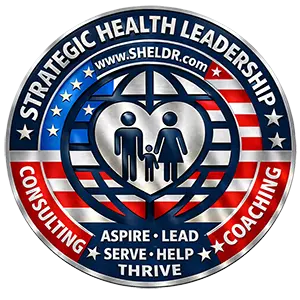BLIP-ZIP STRATEGIC HEALTH LEADER (SHELDR) ADVICE
Table of Contents
Introduction
I stumbled into most of the mentorship relationships throughout my career. I did my best to build a reputation of integrity, proactiveness, aspirational thinking, and a can-do (did do) spirit. Ideas are only valuable if you follow through.
I also figured out LOYALTY to the mission, patient, and individual mentor went a long way. They were finding common ground, asking for advice, exchanging ideas in a two-way manner, looking out for their blind sides, and demonstrating increased competence.
For one mentor, I sent my Air War College research papers on bioterrorism response and why health administrators should also be part of the international health specialist program. That started the relationship. Equally important, some individuals wanted nothing to do with me: no match, chemistry, or bond. In one case, a senior leader would not hire me as a medical group commander because they thought I was too aggressive. It may have been, but I became a group commander in another command. Go figure.
Finding a mentor is about the law of natural attraction, mindfulness, and demonstrating who you are and what you are capable of (and not) in an authentic manner. During the past several years, I’ve been giving back to the profession that made me good, bad, and ugly as a professional military healthcare administrator in the United States Air Force.
Transformative Journey of Finding a Mentor
Long after retirement, in September 2019, the Medical Service Corps (MSC) Association (MSCA) conducted its inaugural professional development webinar: Mentoring in the 21st Century. We chose mentoring as the topic for this initial offering, as many of us consider this a core competency for MSC officers. Additionally, most of us have benefited from and can attribute much of our success to the mentoring we received throughout our professional lives. It’s part of the MSC DNA or “secret handshake.”
Speaking for myself, the sage counsel I received from great MSC leaders was critical to my success during my career. I suspect anyone reading this could likewise rattle off the names of people who helped them navigate crucial personal and professional decisions. I was pleased to “pay it forward” when the opportunity arose for me to help others as a mentor. Our webinar discussed these two sides of the mentoring coin – being mentored and being a mentor.
Deconstructing Mentorship: Unraveling the Wisdom of Seasoned USAF MSC Leaders
Col (Ret) Steve “DrS” Meigs, former USAF MSC Corps Chief, defines mentoring as a relational process intended to develop or enhance an individual’s potential. Traditionally, we think of mentoring as a collaborative process between mentor and mentee, wherein one person empowers another through an extended dialogue. In the best case, this occurs in a natural relationship and through an open exchange of ideas between mentor and mentee.
Mentoring goals are not to tell someone what to do or how to do it but to understand the mentee’s goals and provide a range of options or ideas to consider that could help achieve desired outcomes. I am unaware of a template or boilerplate for the mentoring interaction, but one way to approach the process is to ask the mentee – “What does success look like to you.” Then, listen and begin the dialogue. The mentoring dialogue involves sharing personal experiences, including the mentor’s past mistakes and lessons learned, and facilitating the mentee’s critical thinking process.
In the traditional definition of mentoring, we think of a process principally focused on career development. In this model, mentors are supervisors or senior leaders, and protégés or mentees are typically subordinates viewed as having high potential. The mentoring relationship is one-to-one, face-to-face, and usually long-term (over many years). For those of us in the Baby Boomer and Generation X cohorts, this is how we were mentored, and this is how we mentored others.
In his book Modern Mentoring (2015), Randy Emelo suggests that more recent generational groups (e.g., Millennials [individuals born between 1981 – 1996] and Generation Z [born 1995 – 2010]) might require a different approach when it comes to mentoring. He suggests that for these individuals, mentoring is not so much focused on career development as it is on “broad learning.” Rather than the hierarchical structure seen in traditional mentoring, newer generations believe advisors (mentors) and learners (mentees) can be anyone in the organization. Note the change in participant labels.
Millennials and Generation Xers view mentoring as a group activity (versus one-to-one), and the mentoring relationship lasts only as long as needed or desired. Finally, these individuals are more comfortable with virtual relationships (including via social media) than traditional face-to-face interactions. Does this sound like the Millennials and Generation Xers in your life?
Regardless of how the mentoring process might be evolving, the fact remains that helping others succeed is an integral part of being a leader. Likewise, seeking counsel and learning from the experiences of others is an essential developmental stage in becoming a leader. MSC officers have always embraced these concepts and continually strive to improve upon the mentoring process. This ethic is one of the reasons our Corps has been and will be successful in producing generations of influential leaders.
The Power of Connection: Unveiling the Essence of True Mentorship
Mentorship is the voluntary, developmental relationship between a person with more significant experience and lesser experience. Mentoring begins when a person strategically affects someone else’s professional life by fostering insight, identifying needed knowledge, and expanding the other person’s horizons. Mentoring is a method of teaching and promoting growth. It involves an experienced individual who teaches and guides someone with less knowledge in given areas.
A developmental, sharing, and helping relationship is where a person invests time, know-how, and effort to enhance an individual’s growth, knowledge, and skills and responds to critical needs in the life of the person in ways to prepare the individual for greater productivity or achievement in the future.
Beyond Superficial Advice: Debunking the Myths of Misguided Mentorship
In its purest form, mentorship is a transformative journey, not a quick fix. It transcends the realm of casual advice and shallow pep talks. It’s not a one-size-fits-all solution nor a guaranteed path to career stardom. While mentorship can be a powerful tool for growth, it’s crucial to debunk the myths surrounding it to avoid misconstrued expectations and misguided relationships.
Forget the notion of mentorship as on-the-job training or a shortcut to success. It’s not about spoon-feeding solutions or dictating career paths. Instead, it’s about igniting self-discovery, challenging perspectives, and fostering critical thinking. It’s about providing a safe space for honest reflection, not a platform for self-promotion or unsolicited pronouncements.
Equally important is to recognize that mentorship is not a substitute for leadership development programs or formal training. While mentors can offer invaluable guidance and support, they are not replacements for structured learning and professional development initiatives. Proper mentorship thrives alongside these programs, outside their place.
So, shed the misconceptions and embrace the true essence of mentorship. It’s not a transactional exchange or a guaranteed ticket to the top. It’s a powerful partnership, a shared journey of exploration, and a commitment to mutual growth. Remember, the most transformative mentors are not miracle workers but skilled guides who illuminate your path, not dictate your destination.
Unlocking Unprecedented Success: The Ripple Effect of Powerful Mentorship
Imagine a ripple effect of success radiating from a single, powerful source. That’s the essence of solid mentorship, where the benefits extend far beyond the immediate relationship. It starts with increased retention and improved morale, building a foundation of stability and positive energy.
Then comes the acceleration of leadership development as mentors guide and empower mentees to reach their full potential. This ongoing career development translates to stronger teams and a culture of continuous learning where everyone grows together.
Ultimately, mentorship unlocks the potential within individuals, teams, and organizations, creating a ripple effect of success that benefits everyone. And the key to maximizing this impact? Shared goals and open communication. Both mentor and mentee must chart their course to greatness together, setting clear objectives, providing timely feedback, and constantly striving to learn and grow from each other. In doing so, they transform the mentoring relationship into a powerful individual and organizational success engine.
From Apprentice to Mastermind: Redefining the Mentee in a Growth-Driven Era
A mentee is willing to learn from someone else’s knowledge and experience to reach their full professional potential. Mentees are being mentored by another person, especially one who makes an effort to assess, internalize, and use effectively the knowledge, skills, insights, perspectives, and wisdom the mentor offers. Mentees are recipients of a mentor’s help, especially those seeking out such help and using it appropriately for developmental purposes whenever needed.
Exponential Growth, Amplified Success: Unlocking the Win-Win Benefits of Mentorship
Mentorship isn’t just a helping hand; it’s a rocket booster propelling both mentee and mentor towards exponential growth and amplified success. Imagine having the focused attention of someone with a wealth of experience, not just guiding you but unlocking your hidden potential. That’s the magic of mentorship.
For the mentee, the benefits are manifold. Performance and skills soar, expertise broadens, and talents are honed to razor sharpness. This personal growth ripples outwards, optimizing the organization’s talent pool, boosting retention, and nurturing future leaders. Morale thrives, teams coalesce, and a culture of continuous learning flourishes. Mentorship isn’t just a one-way street; it’s a vibrant exchange of ideas and lessons learned, where mentors gain fresh perspectives and the satisfaction of seeing their knowledge blossom in others.
Ultimately, mentorship is a win-win. It accelerates leadership development, promotes organizational well-being, and leaves a legacy of growth and success for both mentor and mentee. So, why settle for “doing all right” when you can soar together? Embrace the power of mentorship and witness its transformative impact on your career, team, and organization.
The Pillars of Transformative Mentorship: A Guiding Light for Growth
A transformative mentor is not simply a leader who offers advice; they are a radiant beacon, guiding mentees towards personal and professional fulfillment. This luminous role rests on several essential pillars:
- Unwavering Commitment: A transformative mentor demonstrates a genuine and active interest in their mentee’s growth. They find personal satisfaction in witnessing their mentee’s success and dedicate themselves to unwavering support.
- Exemplary Leadership: A stellar role model, the mentor embodies the organization’s values with integrity and authenticity. They inspire their mentee by walking the talk and demonstrating the true meaning of leadership through their actions.
- Open Ears and Honest Feedback: A transformative mentor is a master listener, actively absorbing their mentee’s concerns and perspectives. They provide candid yet constructive feedback, illuminating blind spots and offering guidance for navigating challenges.
- Shared Wisdom and Opportunities: Drawing from their hard-won experience, the mentor opens opportunities for valuable learning. They suggest relevant resources, connect their mentee with key individuals, and share insights that accelerate their growth.
- Dedicated Time and Presence: Time is a precious gift, and a transformative mentor prioritizes spending quality time with their mentee. They ensure regular meetings, offer uninterrupted time for open communication and remain readily available for support and guidance.
- A Collaborative Partnership: A transformative mentor fosters a collaborative partnership with their mentee, setting clear goals and objectives together. They track progress, document critical areas of development, and celebrate successes along the way.
- Trust and Confidentiality: A foundation of trust is essential. The mentor upholds the highest standards of confidentiality, creating a safe space for the mentee to share openly and explore vulnerabilities without fear of judgment.
By embodying these pillars, a transformative mentor becomes more than just a guide; they become a catalyst for growth, a source of inspiration, and a testament to the transformative power of connection. They ignite the potential within their mentees, illuminating the path toward a brighter future.
Own Your Journey: Active Ingredients for a Thriving Mentee Mindset
Forget passive absorption of wisdom – a thriving mentee is an active explorer, a self-directed architect of their growth. This journey begins with responsibility and a willingness to embrace challenges and new opportunities, not just as obstacles but as stepping stones to success. Be open to your mentor’s feedback, share your vulnerabilities, and be clear about what areas you want to develop. Take ownership of your goals, actively pursue self-improvement, and seek broader responsibilities. Don’t be a passive recipient; initiate, maintain the relationship, and prioritize regular meetings.
Remember, your success is your responsibility. Invest your time and resources, make it easy for your mentor to offer honest feedback, and honor your commitment to shared goals. Ultimately, a thriving mentee is a proactive partner driven by a desire to learn, grow, and achieve the maximum benefits of this powerful relationship. So, embrace your role, take the lead, and watch your journey to success unfold.
Building Bridges of Growth: Forging an Unbreakable Mentor-Mentee Bond
A thriving mentor-mentee relationship isn’t just a partnership; it’s a bridge built on sturdy pillars of trust and mutual respect. Both parties recognize the value each brings to the table, creating a foundation for reciprocal responsibility. As you navigate the journey together, your interactions’ intensity, focus, and breadth may ebb and flow. Still, the dynamic nature of your bond ensures it remains ever-evolving and adaptable.
Remember, your relationship is unique. Your personalities, styles, and talents blend to create a one-of-a-kind partnership, with your standards and measures of success adding further richness to the mix. While some mentor-mentee bonds stand the test of time, fueled by mutual initiative, interest, and investment, others may run their course. Open communication is key here – if the relationship no longer serves its purpose, be honest and respectful in expressing your desire to move on.
Building an unbreakable bond isn’t about rigidity; it’s about embracing the dynamism, uniqueness, and potential for mutual growth that comes with forging a bridge of trust and shared respect. So, step onto that bridge, celebrate its ever-changing contours, and enjoy the personal and professional transformation it leads you on.
From Vision to Reality: Crafting Goals and Action Plans for Success in Mentorship
Planned mentor relationships need focused goals and activities that meet both the needs of the mentor and mentee. The purpose of the goal-setting session is to allow the mentee to articulate a vision for self-empowerment (educational, leadership, career, learning outcomes) and to get to know each other. The mentor should be prepared to listen and support the mentee in identifying steps to be taken toward the mentee achieving their goals.
Become a Magnet for Mentorship: 15 Strategic Actions to Attract Your Ideal Mentor
Forget passive waiting! This action-packed guide empowers you to take control of your future. Discover 15 proven strategies to become a magnet for mentorship, attracting the perfect guide who will elevate your career and unleash your potential. There is no more guesswork, just targeted action and accelerated growth.
- Self-Reflection: Examine your strengths, weaknesses, and areas for growth. Be honest about your current capabilities and places where you need improvement.
- Clear Goals: Define career goals and the specific areas where you seek guidance and mentorship. Having clear objectives will demonstrate your commitment and seriousness as a mentee.
- Proactive Approach: Take the initiative to seek out potential mentors. It will be hit-and-miss, but finding the right chemistry will go a long way. Reach out to individuals with expertise and experience in your desired field and express your interest in being mentored.
- Demonstrated Effort: Show your dedication and enthusiasm for personal and professional development. Engage in continuous learning, attend workshops, seminars, or conferences, and present your willingness to invest in your growth.
- Willingness to Learn: Be open to feedback and constructive criticism. A desire to learn and grow shows mentors that you are receptive to guidance and can adapt to new challenges.
- Take Responsibility: Take ownership of your actions and decisions. Acknowledge your mistakes and learn from them. Demonstrating accountability shows maturity and a commitment to self-improvement.
- Persistence: If you encounter setbacks or rejections, don’t be discouraged. Keep trying and seeking mentorship opportunities. Perseverance and resilience will show mentors your determination to succeed.
- Be Respectful: Show respect for potential mentors’ time and expertise. Be punctual, attentive, and prepared during interactions.
- Offer Value: While mentors are there to guide and support you, also consider what value you can bring to the mentorship relationship. Share your unique perspectives, experiences, and skills that can also benefit the mentor.
- Show Appreciation: Acknowledge and express gratitude for the mentor’s time, advice, and support. A sincere appreciation reinforces the mentor’s belief in your commitment and worthiness.
- Implement Feedback: Take the feedback and guidance you receive from mentors seriously. Act on their suggestions and demonstrate your progress and growth over time.
- Be a Good Listener: Demonstrate active listening during mentorship sessions. Show that you value the mentor’s insights and are willing to learn from their experiences.
- Build Trust: Cultivate a trustworthy and reliable reputation. Maintain confidentiality when necessary and demonstrate integrity in your actions.
- Seek Diversity: Consider seeking mentorship from individuals with diverse backgrounds and perspectives. Embrace diversity to broaden your learning and understanding.
- Pay it Forward: Once you have gained valuable insights from a mentor, consider becoming a mentor to others. Paying it forward shows your commitment to fostering a culture of learning and growth.
Questions for Mentees Before Finding a Mentor
1. What are my top 3 professional development goals? (clarity, purpose)
2. What specific skills or knowledge do I need to acquire? (specific needs for mentor expertise)
3. What leadership style resonates most with me? (compatibility for effective learning)
4. Am I open to constructive criticism and feedback? (willingness to learn and grow)
5. What value can I offer a potential mentor in return? (understanding mutual benefit)
These revised subheadings and suggested questions incorporate more robust keywords, action verbs, and intriguing language to improve SEO math scores and captivate the audience’s attention. Remember to keep these suggestions flexible and adapt them to your specific content and target audience for optimal results.
Summary
By embodying these qualities and demonstrating your commitment to growth and development, you can overcome obstacles and prove yourself worthy of being a mentee to potential mentors. Remember, mentorship is a two-way relationship, and your active participation and dedication play a significant role in its success.
What Are You Waiting for?
What Are You Waiting for?

About the Author: I am passionate about making health a national strategic imperative, transforming and integrating health and human services sectors to be more responsive, and leveraging the social drivers and determinants of health (SDOH) to create healthier, wealthier, and resilient individuals, families, and communities. I specialize in coaching managers and leaders on initial development, continuously improving, or sustaining their Strategic Health Leadership (SHELDR) competencies to thrive in an era to solve wicked health problems and artificial intelligence (AI).
Visit https://SHELDR.COM or contact me for more BLIP-ZIP SHELDR advice, coaching, and consulting. Check out my publications: Health Systems Thinking: A Primer and Systems Thinking for Health Organizations, Leadership, and Policy: Think Globally, Act Locally. You can follow his thoughts on LinkedIn and X Twitter: @Doug_Anderson57 and Flipboard E-Mag: Strategic Health Leadership (SHELDR)




